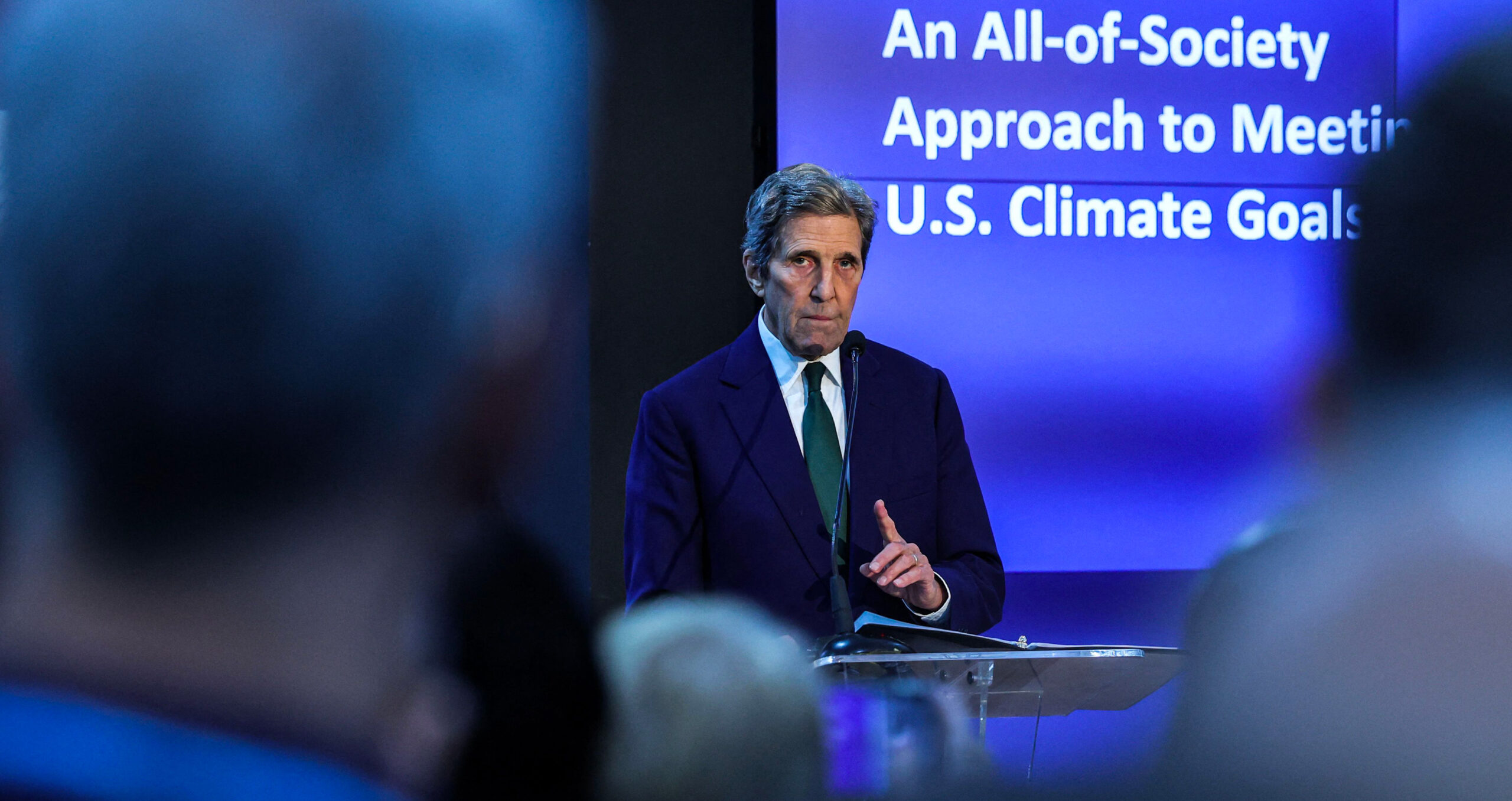
John Kerry launches carbon credit plan to decarbonise low-income countries

The US climate envoy defends the initiative against greenwashing accusations and says fossil fuel companies won’t be allowed access to the system.
US climate envoy John Kerry launched a plan at COP27 today that would allow companies to buy carbon credit offsets in exchange for financing the decommissioning of coal power stations and renewable energy plants in low-income countries. Backed by the Rockefeller Foundation and the Bezos Earth Fund, the so-called Energy Transition Accelerator would, said Kerry, catalyse much-needed private capital to accelerate the clean energy transition in developing nations.
A UN report published yesterday, however, warned against the use of offsets, whose record on reducing emissions is at best patchy, and at worse an excuse for corporate greenwashing.
Flanked by the CEOs of the Rockefeller Foundation and the Bezos Earth Fund, the UN special representative for sustainable energy, and high level representatives from Microsoft, Pepsi, the government of Nigeria and US NGO the Environmental Defense Fund, Kerry staunchly defended the ETA. In response to hecklers accusing him of “promoting greenwashing” as he announced the initiative at the US COP pavilion, Kerry insisted “no fossil fuel company” would be allowed to partake in the ETA and that he had the blessing of UN secretary general António Guterres to move forward.
“He [Guterres] made it clear that if there are safeguards and transparency and […] no double counting, no greenwashing, we need [the ETA],” said Kerry. “That if environmental integrity is built in, we should go for it. It is a critical tool. We can institutionalise guardrails.” He added that “anybody reasonable” would agree. The “guardrails” include: only having the ETA as a short-term solution (Kerry mooted 2030 as a potential end date for the scheme); working by jurisdictions rather than by projects; and only allowing support for the decommissioning of coal power plants or for wind, solar or geothermal projects to be counted as credits.
“This is not some grandma-grandpa credit, but a 2022 credit,” insisted Kerry. “Every company that takes part still has to reach net zero by 2050, nobody is off the hook, nobody is trying to pull a fast one. If we don’t find more money, multiply renewable energy sixfold, we ain’t gonna get this job done.” There is no time to waste, he added. “We are not going to waddle – this has to move as rapidly as crisis demands.”
NGO reservations
Many NGOs are concerned that the plan lacks integrity and risks undermining other work being done on innovative financing for poorer countries, such as the just energy transition partnership (JETP) signed at COP26 between western nations and South Africa.
“There is a clear need for significantly scaled-up energy transition finance, but it is hard to see how voluntary carbon credits fits into this,” said Leo Roberts, research manager at E3G, a UK climate think-tank. If Kerry’s initiative becomes reality, “the world needs clear assurances it will deliver a new contribution to decarbonisation, and not come a greenwashing initiative,” Roberts added.
The barriers to investing in developing countries are not simply financial, but also institutional and political, and the focus should remain on mobilising grant and concessional finance, he said. Meanwhile, Jonathan Crook at Carbon Market Watch commented: “Buying emission reductions from developing countries is not the same thing as channelling climate finance.”
Ninety-six per cent of private finance mobilised through blended finance flows to countries with a sovereign credit rating, excluding most low-income nations. Further, blended finance dropped 60 per cent in 2019-22 compared to 2016-18, according to a report published today by Convergence, a global blended finance network. This fall is “very concerning”, said Nina Seega at the Cambridge Institute for Sustainability Leadership. “Calls to reform international finance institutions and drive private finance investment by derisking climate investments in economically poorer countries are the key to delivering on climate ambition.” she said.
How exactly Kerry’s initiative would help achieve this goal is unclear. If it is to play a real role in speeding up the energy transition, “it will need a robust verification framework and a well thought-through approach as to when these credits can be used,” said Seega. She described the plan’s suggestion that some credits could be used “to address a limited portion of Scope 3 [downstream] emissions within a company’s near-term target” as “interesting” but said this would need to happen within a “sector-specific framework”.
The US government said it would consult with the Science Based Targets Initiative, the recently established Voluntary Carbon Markets Integrity Initiative and the Integrity Council for the Voluntary Carbon Market on the creation of the ETA.
Photo credit: Getty Images
Similar Articles

Esma guidelines on sustainability rules for European funds deemed ‘vague’

Unclear sustainability policies risk driving green investment out of UK


